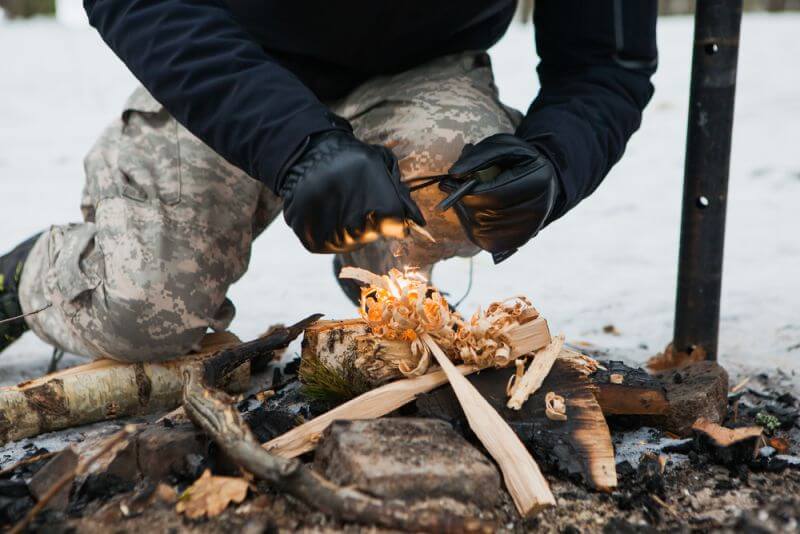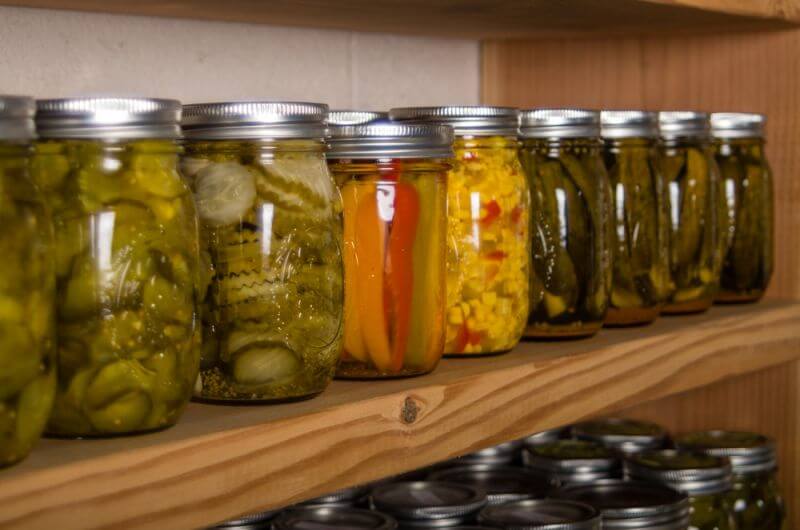In comparing the continuum of survival needs to the historical record, famine is one of a few disasters that takes entire civilizations off the map. Your great grandparents and everyone before them spent far more money on food, as a percentage of income, than we do today and had a healthy fear of famine, storing food to last through the winter and in case of a poor harvest.
Today, food is comparatively inexpensive, and few Americans have experienced hunger involuntarily, causing them to take food security for granted, and any student of history knows that this is something that a civilization must never do.
Modern Threats Kill the Old-fashioned Way
Whether a civilization perishes due to war, drought, a cold snap or simply using up the available resources, famine and disease are the mechanisms that often claim the bulk of the lives. Even in past plagues, many ended up dying from hunger. The havoc wrought on the supply chain by the COVID-19 pandemic should make it plain for all to see how more people can end up dying from hunger that results from disruption of food production and distribution, rather than the disease itself. Even modern threats such as cyberwarfare, EMP or HEMP will end up killing via the old-fashioned mechanisms of hunger and disease.
All one needs to do is to look at the current crises. According to the UN, the current volatility has set world hunger back to the level it was at in 2008-2009. 1-in-11 people faced hunger in 2023 worldwide and 1-in-5 faced hunger in Africa. That is well over 700 million undernourished people. (Palmquist, 2024) Regardless of the source of the volatility, hunger always seems to do the bulk of the dirty work.
An Argument for Listening to Your Ancestors
There is a wisdom in the practice of food storage that comes from cultural memory. It comes from countless millions of lives lost to hunger in the 2000 generations that have passed since man’s dispersal out of Africa. (Richard J. Wang, 2023) Academics are far too quick to dismiss heuristic traditions borne of cultural memory … traditions that we benefit from even though the average person would struggle to describe how in precise language. For example, most cultures had traditions of hygiene that predated the microscope and the discovery of microbes.
Even though they didn’t understand the role that microscopic pathogens play in causing illness, most cultures had traditions of cooking food, bathing, and laundering clothing which encouraged proper hygiene and promoted good health. That’s the power of the collective wisdom that we call cultural memory.
Yet a certain breed of academic too often overestimates their own capacity to comprehend the significant problems that we face, especially those problems that require nonlinear thinking to solve. They loudly proclaim that they know what’s best for the world as they throw the baby out with the bathwater.
The Four Pests Campaign
Just as Chinese academics did when they convinced the Chinese Communist Party governing Maoist China to embark on the Four Pests Campaign as part of The Great Leap Forward. They declared that “Mosquitos, flies, sparrows, and rats must be eradicated!” They saw the sparrows eating rice, failing to notice that they were eating far more pests than rice and in exterminating sparrows, provoked a famine that killed between 20 and 30 million of people! (Wikipedia, The Four Pests campaign, 2024)
So, the next time an academic tells you that you we need to get rid of sparrows, bathing, the pledge of allegiance, prayer, religion, Christmas, Thanksgiving or some other heuristic tradition, you might hit the pause button and take a moment to consider whether or not you, your kids, or society might possibly be benefiting in some way from that tradition before discontinuing it. America might just benefit from paying greater heed to our cultural memory, collective wisdom, and common sense.
The Tradition of Food Storage and Production
Speaking of common sense, certainly since the advent of agriculture, many cultures developed traditions of food storage because food has always been necessary to survive volatility.
Although food storage options were somewhat limited for the hunter gatherer, they developed low-moisture foods such as dried, smoked or salted meats and insect pastes, pemmican and an array of fermented foods. Some tribes in the desert Southwest carried dried foods, which they reconstituted with water heated by dropping hot stones into a leather boiling bag, sharing many similarities with the way modern backpackers reconstitute freeze dried meals on the trail.
During his survival ordeal adrift in the Pacific for over a year, Salvador Alvarenga experimented with methods of preserving the sea birds that landed on his small boat. He learned to lay motionless until the birds began to rest and then snatched them. He dried thin strips of meat on the cover of his broken outboard motor which grew hot under the rays of the sun. Later, he realized that by breaking a wing, the birds could not fly away and could survive for weeks until he needed them for food.
Surely hunter-gathers learned the basics of animal husbandry through similar experimentation, keeping fish, reptiles, birds, and mammals alive “on the hoof” to prevent spoilage until they were needed for food.
For farming to work, farmers had to store food to last the winter and against a year with a poor harvest, so they created granaries and developed increasingly complex food preservation and storage methods.
Why Food Storage and Production Are Still Important Today
With the abundance of inexpensive food available in developed nations, one could conclude that food storage is no longer necessary. For their entire lifetimes, many Westerners never experienced hunger against their will, causing them to take the availability of food for granted.
The Turkey Illusion
This is another example of cognitive bias now described as the Problem of Inductive Knowledge, that philosopher Bertrand Russell illustrated in the “turkey illusion”.
A turkey is fed and cared for by a man. Every day the man brings the turkey food and water, and with every day that passes, the turkey’s certainty that the man will only feed him and never harm him grows and grows … until just before Thanksgiving, the man, a butcher, slaughters the turkey and prepares him for Thanksgiving dinner. (Wikipedia, 2024)
It sounds just like the Pentagon’s press releases about the “normal activity” of Russian bombers flying right up to Alaskan airspace and then turning back. “They’ve done this hundreds of times, it’s nothing to worry about! There’s nothing to see here, go back to paying your taxes.” Or economists on Wall Street telling us, “I’m an old man, and my entire life, the S&P 500 have only increased as long as you stay in it for the long haul.”
It does until one day it doesn’t. The man feeds the turkey only until it’s time to slaughter it, the Russian bombers turn back until they decide to attack, the stock market is stable until people stop believing in the funny money Washington is printing, our food production and distribution will work until any of a dozen or more disasters disrupt it.
The next time that you need your food storage could be tomorrow, or it might not happen in your lifetime. While the chance a given disaster will occur in a given year (risk) might be low, the number of potential disasters is unknown and the effect such a disruption would have on us (exposure) is that millions could die. So, if one’s goal is to survive, then the exposure for those who die could not be higher. How often do you hear about a “once in a hundred-year flood” or a “once in a hundred-year storm”?
Global Food Production and Distribution is Inherently Fragile
While the food distribution system might appear solid, due to globalization, urbanization and large-scale monoculture on factory farms, the world food distribution system has never been more fragile, putting people in a unique position today.
For all of our ingenuity, we cannot help engineering fragility into complicated systems such as large cities, the power grid, the world economy, global transport, global communication and IT infrastructure, modern healthcare systems, fossil fuel production and distribution, global food production and distribution … in short, the very things that we depend on to live.
Food Storage and Home Food Production Provide Security in an Uncertain World
Virtually every form of volatility one can be faced with: war, pandemic, economic collapse, EMP, HEMP, cyberattack, drought, climate change, natural disaster or the more common, lesser forms of volatility such as injury, disability or job loss … food storage is necessary to survive them all.
Less than 100 years ago, the USA suffered through the Great Depression. About a quarter of the country raised gardens at that time, and another quarter of the population had parents or family who gardened enabling them to plant gardens and perhaps keep a few chickens, saving millions of Americans from starvation. If a similar disruption to the food supply happened today, less than 2% of the nation produces any of the food that they consume at all.
My grandparents lived through the Great Depression, and it was plain for me to see how it affected their habits for the rest of their lives. They saw the butcher slaughter his turkeys and were not going to let that fate befall them and now that you understand the cognitive bias known as the “turkey illusion” and the Problem of Inductive Knowledge relative to food storage, it is up to you to do something about it.
While food storage and a small garden are more difficult for most Americans to afford than they were before the reaction to the COVID-19 pandemic, reckless government spending and the inflation they caused put the squeeze on working Americans, it would be foolish to wait for things to improve. If you haven’t already, right now is the time begin storing food and to start a garden, plant food trees or add a chicken coop. For those who have these measures in place, this is the time to take inventory, remedy any deficiencies and plan for expansion of food storage and gardens.
References
- Palmquist, A. (2024, July 24). Hunger numbers stubbornly high for three consecutive years as global crises deepen: UN report. Retrieved from who.int/news: https://www.who.int/news/item/24-07-2024-hunger-numbers-stubbornly-high-for-three-consecutive-years-as-global-crises-deepen–un-report
- Richard J. Wang, S. I.-S. (2023, January 6). Human generation times across the past 250,000 years. Retrieved from science.org: https://www.science.org/doi/10.1126/sciadv.abm7047
- Wikipedia. (2024, October 24). The Four Pests campaign. Retrieved from wikipedia.org: https://en.wikipedia.org/wiki/Four_Pests_campaign
- Wikipedia. (2024, August 25). Turkey illusion. Retrieved from wikipedia.org: https://en.wikipedia.org/wiki/Turkey_illusion










Travelin On | November 22, 2024
|
“If a similar disruption to the food supply happened today, less than 2% of the nation produces any of the food that they consume at all.”
Very thankful to be part of the 2% and more than that to know how to be part of the 2%!!! Amazing how many know how or have some experience in that direction but do nothing with it.
Ronald Levine | November 23, 2024
|
There will be a time to garden and raise food and animals, but counterintuitively it’s NOT when it is first needed. There are a plethora of people who will kill for what you produce. They will succeed at the cost of many lives multiple times until they don’t. Eventually, the takers will have died off and those remaining alive will be good neighbors and that is when we can garden and raise animals. I’ll disappear from the desperate population densities until that sociological change. How long does that take? Starving to death isn’t lasting. Sure, I’ll feel bad for them, but there will be too many millions of them for anything I can do to help them. Prevention was my role in trying to help them, but they voted for their own demise. It’s not over because they are fighting for government to solve everything and will be so surprised when government fails to rescue them from starvation. Starvation around the world has its basis in government use of it for political agendas.